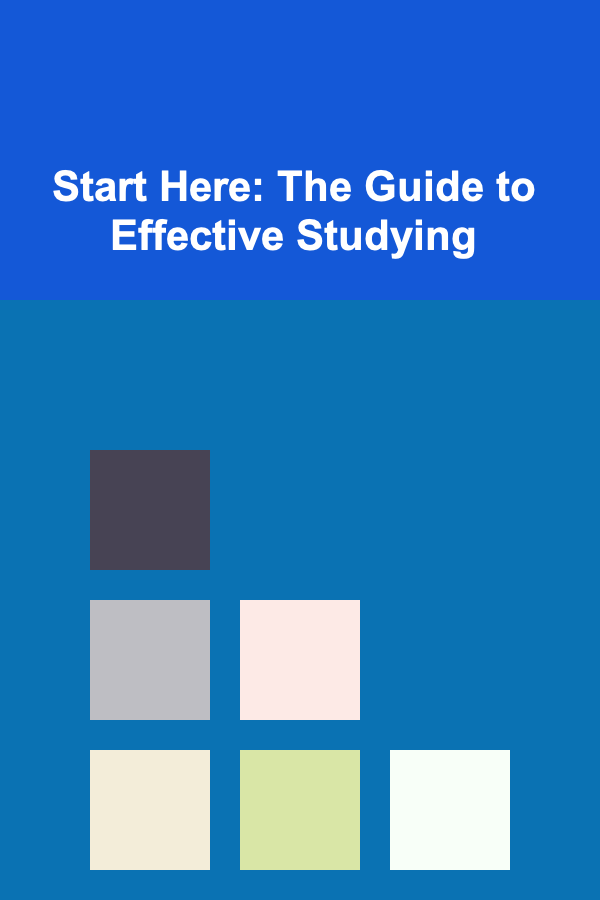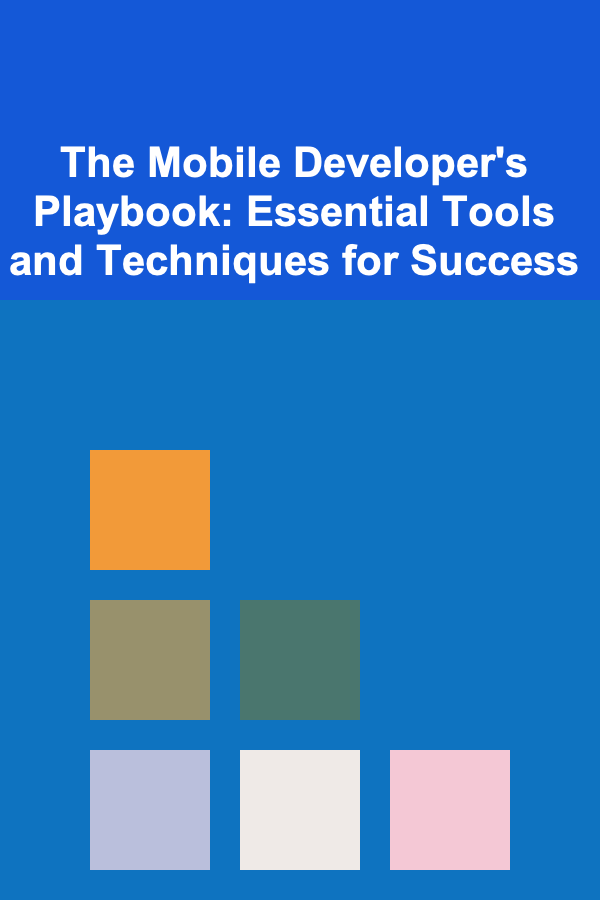
Start Here: The Guide to Effective Studying
ebook include PDF & Audio bundle (Micro Guide)
$12.99$10.99
Limited Time Offer! Order within the next:

Studying effectively is an essential skill that significantly impacts academic success and lifelong learning. However, studying isn't just about sitting at a desk and reading textbooks---it's about developing strategies and habits that maximize your ability to retain, comprehend, and apply information. This guide aims to equip you with actionable strategies for efficient studying, based on proven techniques that will help you make the most out of your study sessions.
Understanding Effective Studying
Effective studying is an active process that requires focus, critical thinking, and organization. It goes beyond simply reading material passively and involves actively engaging with the content. It is not about the number of hours spent studying, but the quality of the study techniques and habits you employ.
Effective studying involves:
- Active recall: Testing yourself on the material to enhance memory retention.
- Spaced repetition: Spacing out your review sessions to reinforce long-term memory.
- Deep learning: Understanding the material thoroughly, rather than just memorizing facts.
- Time management: Organizing your study time to balance study, rest, and other commitments.
By adopting these strategies, you'll be able to study more efficiently and effectively.
Setting Clear Goals
Before diving into studying, it's crucial to define clear goals. Without a clear sense of direction, it's easy to become overwhelmed and disorganized. Whether you're preparing for an exam, learning a new skill, or completing a project, having clear objectives will guide your study sessions.
Actionable Tips:
- Break Down Long-Term Goals: If you have a big exam or project in the future, break it down into smaller, more manageable tasks. This approach prevents procrastination and makes the overall goal feel less intimidating.
- Set Daily or Weekly Goals: Define what you want to achieve each day or week. For example, "Today, I will finish reading Chapter 3 and complete the practice questions."
- Focus on Results, Not Time Spent: Instead of thinking about how many hours you plan to study, focus on what you want to achieve by the end of your session.
Organizing Your Study Environment
A cluttered or noisy environment can distract you and reduce your productivity. Creating an ideal study environment can enhance your focus and performance. Find a space that is conducive to studying, whether it's a quiet corner in your home, a library, or a café.
Actionable Tips:
- Declutter Your Workspace: Remove unnecessary distractions from your desk. Keep only the materials you need for studying (books, notes, stationery, etc.).
- Control Your Environment: Choose a quiet, well-lit space. If you need some background noise, consider listening to instrumental music or white noise to block out distractions.
- Limit Digital Distractions: Keep your phone out of reach, or use apps that block distracting websites while you study.
Using Active Learning Techniques
Active learning involves engaging with the material in a way that encourages you to think critically and deeply. Passive reading and highlighting may not be enough for retaining complex concepts. Instead, try strategies that promote active involvement.
Active Recall:
Active recall involves testing yourself on the material rather than just reviewing it passively. This helps strengthen your memory and deepen your understanding.
Actionable Tips:
- Use Flashcards: Create flashcards with questions on one side and answers on the other. Regularly test yourself to reinforce what you've learned.
- Practice Retrieval: After reviewing a topic, close your book and try to recall the key concepts from memory. This forces your brain to retrieve information, which strengthens memory retention.
Spaced Repetition:
Spaced repetition is a technique where you review material at increasing intervals over time. Research has shown that revisiting material after short intervals helps to combat forgetting and improves long-term retention.
Actionable Tips:
- Use Spaced Repetition Software: Tools like Anki or Quizlet can automate spaced repetition, helping you review flashcards at optimal intervals.
- Create a Review Schedule: Set a schedule to review material on the day after learning it, then again after 3 days, then 7 days, and so on.
Deep Learning vs. Surface Learning
One of the most significant distinctions in effective studying is the difference between deep learning and surface learning. Surface learning involves memorizing facts and details without understanding the bigger picture. Deep learning, on the other hand, focuses on understanding concepts, making connections, and applying knowledge to real-world situations.
Actionable Tips for Deep Learning:
- Explain Concepts in Your Own Words: After reading a section of your textbook, try explaining it in your own words as if you were teaching it to someone else. This will force you to internalize the information.
- Ask "Why" and "How": When learning new material, ask yourself questions like "Why is this important?" and "How does this connect with what I already know?"
- Use Real-World Applications: Try to connect the concepts you're studying to real-world examples or scenarios. This makes learning more meaningful and easier to understand.
Time Management for Studying
Time management is a vital skill in effective studying. Without proper time management, you may struggle with procrastination, feel overwhelmed, or fail to cover all the material you need to learn. Effective time management is about finding balance, focusing on high-priority tasks, and avoiding burnout.
Actionable Tips:
- Use the Pomodoro Technique: Break your study time into intervals (e.g., 25 minutes of studying followed by a 5-minute break). After four intervals, take a longer break (15-30 minutes).
- Prioritize Tasks: Start with the most important or difficult tasks first when your focus is at its peak.
- Create a Study Schedule: Plan out your study sessions in advance, allocating specific times for each subject or task. Make sure to balance study time with rest and recreation to avoid burnout.
Active Note-Taking Strategies
Taking effective notes is one of the most important study skills you can develop. Good notes serve as a valuable resource when revising, helping you organize information in a clear, concise, and accessible way.
Actionable Tips:
- Use the Cornell Method: Divide your page into three sections---one for notes, one for key points or questions, and one for a summary. This method helps you engage with the material as you write and makes it easier to review later.
- Use Diagrams and Charts: Visual aids like diagrams, charts, and mind maps can help you understand complex topics more easily. These tools help you organize information visually, making it easier to see relationships between ideas.
- Summarize Key Points: Instead of writing down everything verbatim, focus on summarizing the main ideas. This encourages you to process the material actively.
Taking Care of Your Mind and Body
Studying effectively is not just about what you do during your study sessions, but also about how well you take care of yourself. Maintaining physical and mental health is crucial to optimal performance.
Actionable Tips:
- Get Enough Sleep: Sleep is critical for memory consolidation and cognitive function. Aim for 7-9 hours of quality sleep per night.
- Exercise Regularly: Physical activity boosts brain function, reduces stress, and increases energy levels. Even short walks or stretches can help clear your mind and improve focus.
- Practice Mindfulness: Mindfulness exercises such as meditation can help reduce anxiety and improve focus during study sessions.
- Stay Hydrated and Eat Well: Proper nutrition and hydration fuel your brain. Avoid excessive caffeine or sugary snacks, as they can lead to energy crashes.
Reviewing and Reflecting
After your study sessions, take time to review what you've learned and assess your progress. Reflection helps reinforce learning and allows you to identify areas where you need more focus.
Actionable Tips:
- Review Your Notes Regularly: Go over your notes at the end of each day and week to reinforce what you've learned.
- Identify Weak Areas: Regularly assess your understanding of the material and identify areas where you're struggling. Focus on these areas during future study sessions.
- Ask for Feedback: If possible, ask teachers, peers, or tutors for feedback on your understanding of the material. This can provide valuable insights into areas for improvement.
Conclusion: Cultivating Lifelong Study Habits
Effective studying is not a one-time skill; it's a habit that you can cultivate throughout your academic journey and beyond. By implementing strategies like active learning, time management, and deep learning, you can study more efficiently and retain information better. Additionally, focusing on your well-being and maintaining a structured study routine will help you stay focused and motivated.
Remember, studying is a process that takes time and practice. Don't be discouraged by setbacks or challenges. With persistence and the right strategies, you'll be able to master the art of studying and achieve your academic goals.
Reading More From Our Other Websites
- [Personal Care Tips 101] How to Incorporate Toothpaste into Your Daily Oral Hygiene Routine
- [Home Budget 101] How to Save Money on Home Furnishings and Appliances
- [Home Renovating 101] How to Avoid Common Mistakes in a Home Renovation
- [Personal Investment 101] How to Use Economic Indicators to Make Smarter Investment Decisions
- [Home Staging 101] How to Create a Welcoming Entryway for Home Staging
- [Organization Tip 101] How to Utilize Entryway Mats for Organized Shoe Removal
- [Organization Tip 101] How to Declutter Your Mind through Home Organization
- [Sewing Tip 101] Best Techniques for Sewing Heat‑Resistant Protective Clothing for Hobbyists
- [Reading Habit Tip 101] Best Approaches to Blend Language Learning with Your Daily Reading Habit
- [Personal Financial Planning 101] How to Negotiate a Lower Interest Rate on Your Student Loans

How to Prepare for Tax Season Throughout the Year
Read More
How to Set Up a Checklist for Managing Your Vacation Photos and Memories
Read More
How to Store Craft Supplies in Your Dining Room Creatively
Read More
The Mobile Developer's Playbook: Essential Tools and Techniques for Success
Read More
10 Tips for Perfect Leather Edge Finishing
Read MoreHow to Choose the Right Fertility Tracker Planner for Your Needs
Read MoreOther Products

How to Prepare for Tax Season Throughout the Year
Read More
How to Set Up a Checklist for Managing Your Vacation Photos and Memories
Read More
How to Store Craft Supplies in Your Dining Room Creatively
Read More
The Mobile Developer's Playbook: Essential Tools and Techniques for Success
Read More